Week 03 - An Overview of Direct Social Work Practice
A presentation at Heritage University at CBC Week 03 in in Pasco, WA 99301, USA by Jacob Campbell

SOWK 486 Fall 2019 Planning: Class 03
Location: CBC Campus - SWL 206
Time: Wednesday from 5:30-8:15
Week 03: 09/02/19 — 09/08/19
Reading Assignment: Hepworth, Rooney, Rooney, and Strom-Gottfried (2016) Chapters 1 & 2
Topic and Content Area: Direct Social Work Practice
Assignments Due: Reading Quiz
Other Important Information: N/A

Agenda
- How we help
- Evidence-based practice
- Involuntary clients
- Ecological Systems Model
- Social work jobs and roles

How Have You Been Supported (1 of 2)
“You can close your eyes to the things you don’t want to see, but you can’t close your heart to the things you don’t want to feel.” —Johnny Depp
Each of us to our own degree has had experiences that were difficult, and often times we’ve had somebody who has supported or comforted us.
[Small Group Activity] You will work in small groups of 3-5 people. Recall a time that you were experiencing an intense emotional difficulty and were comforted and supported…
- How did you “know” that person was being supportive
- What behaviors and words did that person use that were helpful to you
- List these on your poster for future reference

How Have You Been Supported (2 of 2)
Recall a time that you were experiencing an intense emotional difficulty and were comforted and supported…
- How did you “know” that person was being supportive
- What behaviors and words did that person use that were helpful to you
- List these on your poster for future reference

The Purpose of Social Work
“Social work practitioners help clients move towards specific objectives…” (hepworth, p. 5)
- Prevention: The timely provision of services to vulnerable persons, promoting social functioning before problems develop.
- Restoration: Efforts to restore functioning that has been impaired by physical or mental difficulties
- Remediation: The elimination or amelioration of existing social problems.

NASW Core Values
In the preamble section, the NASW Code of Ethics gives six different values.
- Service: I think about this we as social workers have to get our jeans a little bit dirty. (The provision of help, resources, and benefits so that people may achieve their maximum potential.)
- Social Justice: I think about social justice in regards to getting out and helping “stop the babies” from flowing down the river. (The idea that in a perfect world all citizens would have “the same basic rights, protection, and opportunities, obligations, and social benefits.”)
- Dignity and worth of the person: I’m reminded of reading Under the Overpass: A Journey of Faith on the Streets of America by Mike Yankoski… and his discussion of just even looking at people who are homeless. (Holding people in high esteem and appreciating individual value)
- Importance of human relationships: Building rapport with our clients, colleagues, for me people all around the world. (Valuing the “mutual emotional exchange; dynamic interaction ; and affective, cognitive and behavioral connections… which creates atmosphere”)
- Integrity: After graduating from the Master’s Commission, my pastor gave me a compass that I keep on my desk as a reminder to follow what’s right (trustworthiness and sound adherence to moral ideals)
- Competence: Constantly growing, improving… think dryfous model of skill acquisition. (Necessary skills and abilities)
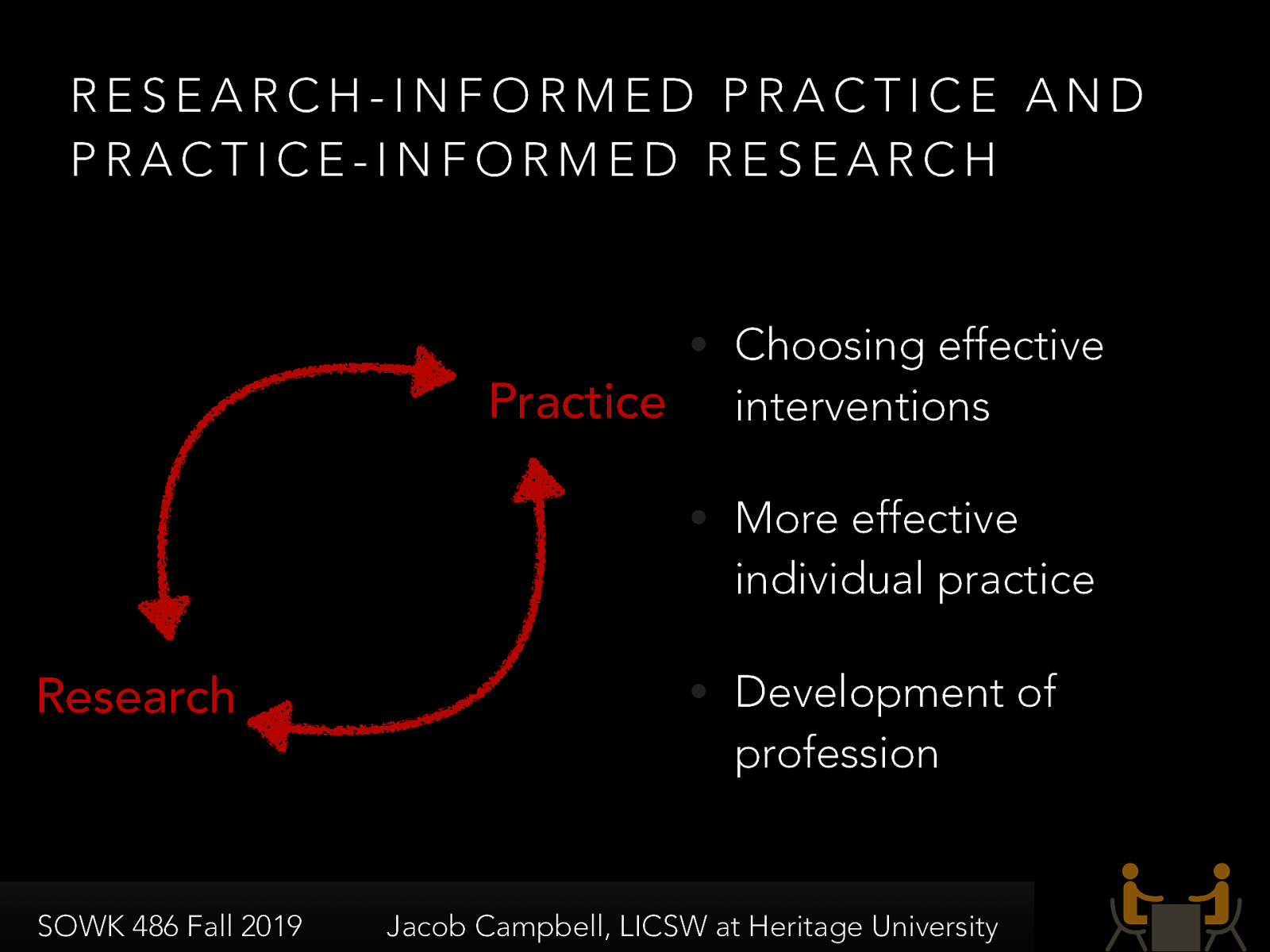
Research-Informed Practice and Practice-Informed Research
Another area of competency for social workers and part of out ecclectic base of knowledge is that of Research-Informed Practice and Practice-Informed Research
[Discussion] Why is social work research important.
Social workers must be able to evaluate effectively the work they do with clients at all levels. The evaluation of macro system effectiveness, and the ability to understand, analyze, and critically evaluate social literature and research.
Why Knowledge about social work research is important
- Choosing effective interventions
- Scientific orientation to identify, evaluate, and choose effective interventions
- Research-informed practice is evidence-based social work
- Framing social work interventions so they can be evaluated through research thus providing information about which specific techniques work best for specific problems.
- Practice-informed research refers to scientific investigation designed to attain results related to successful social work practice.
- More effective individual practice
- The second reason research is important is because with this scientific perspective, it can guide social workers to become more effective in their practice.
- Development of profession
- The third reason is that accumulated research helps to build an effective knowledge base for the social work profession.
- This helps define social work practice, increase the effectiveness of interventions, and enhance the professions accountability.
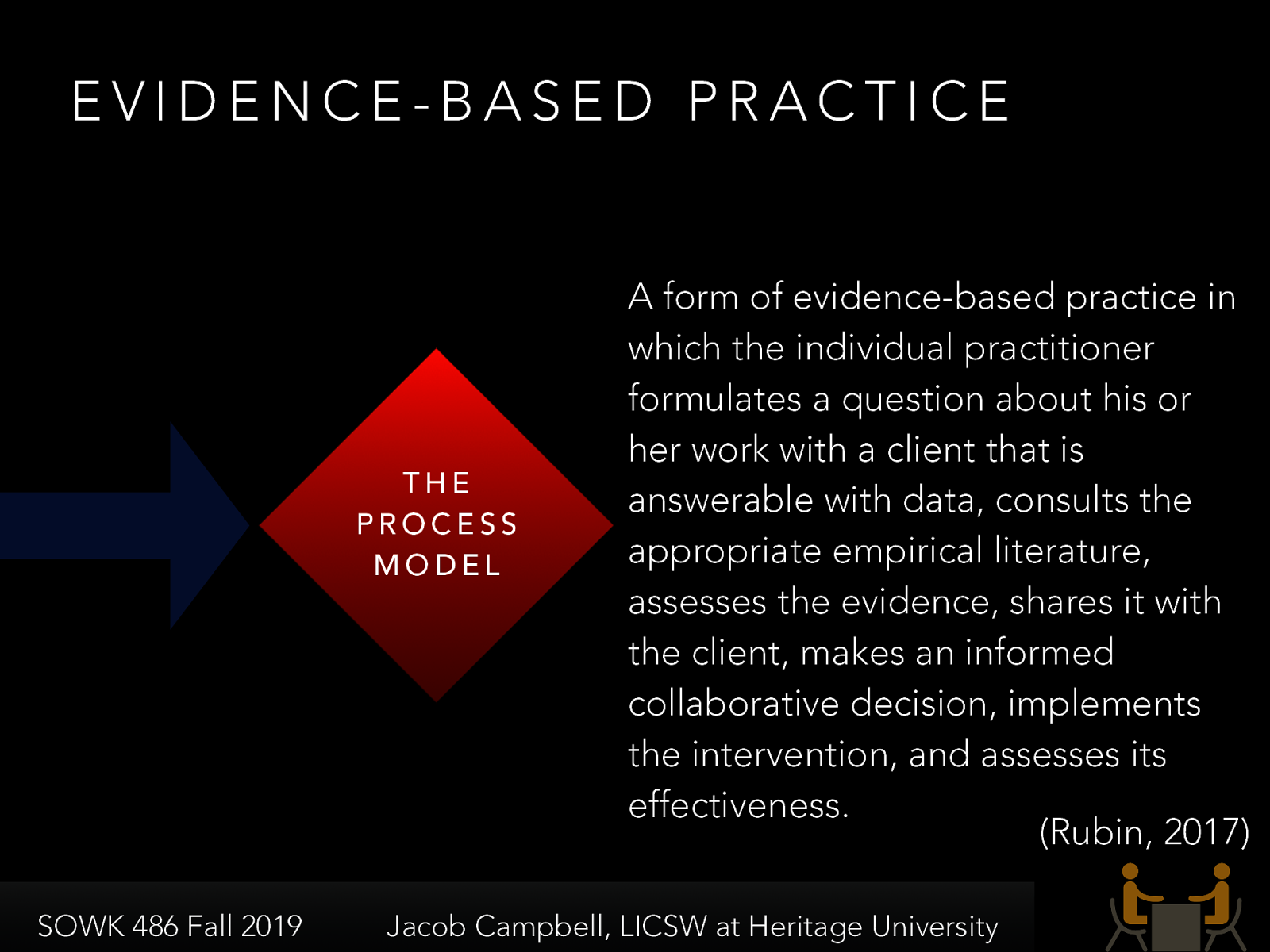
Evidence-Based Practice - The Process Model
The most standard, but also the hardest way to complete practice is through what Rubin (2007) describes as the Process Model.
“A form of evidence-based practice in which the individual practitioner formulates a question about his or her work with a client that is answerable with data, consults the appropriate empirical literature, assesses the evidence, shares it with the client, makes an informed collaborative decision, implements the intervention, and assesses its effectiveness.” (Hepworth, et al., 2017)
- Formulate question
- Shares research with client for collaborative decision
- Implements and assesses intervention
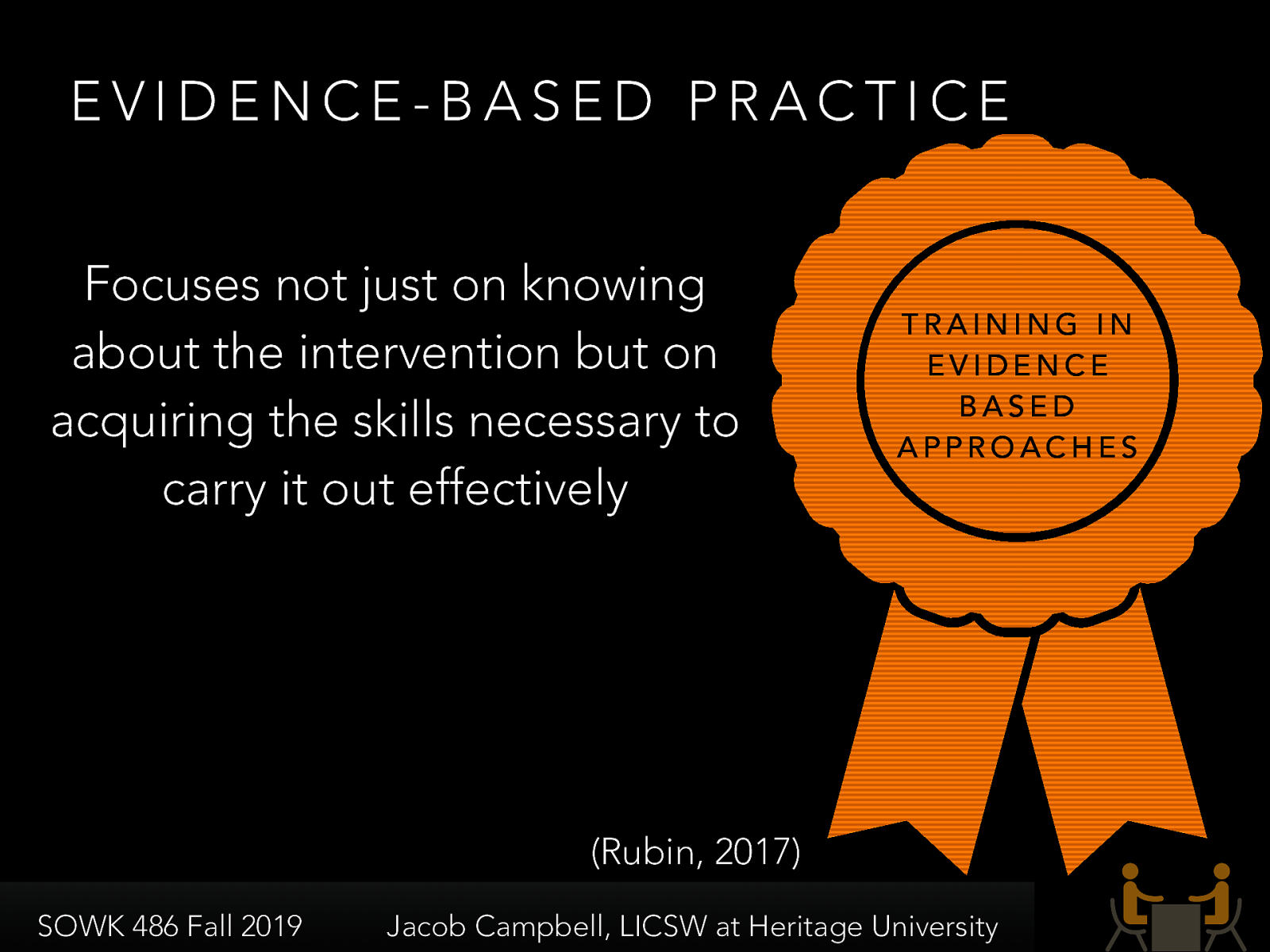
Evidence-Based Practice - Training in Evidence Based Approaches
Very common is getting specific training in a particular EBP (i.e. ART, Guiding Good Choices, etc.)
“focuses not just on knowing about the intervention but on acquiring the skills necessary to carry it out effectively” (Hepworth, et al. 2017, p. 19)
Concerns Include: Generalize beyond effectiveness, short-term nature of of EBP
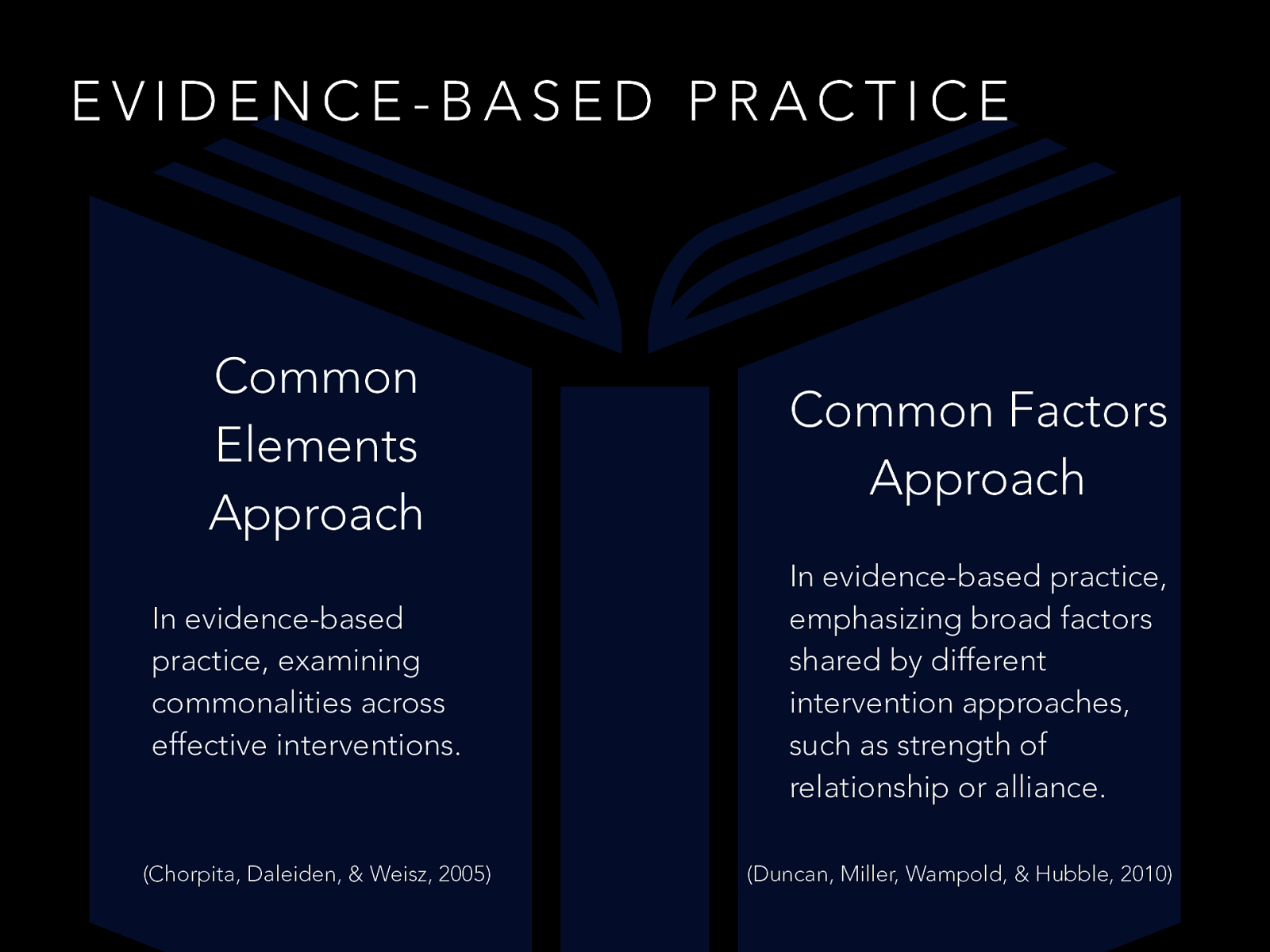
Evidence-Based Practice - Other
In working with clients, taking a more eclectic approach is sometimes the method. This is especially true with increased use of training in EBP’s…
Common Elements Approach: In evidence-based practice, examining commonalities across effective interventions (Chorpita, Daleiden, & Weisz, 2005).
Common Factors Approach: In evidence-based practice, emphasizing broad factors shared by different intervention approaches, such as strength of relationship or alliance (Duncan, Miller, Wampold, & Hubble, 2010).
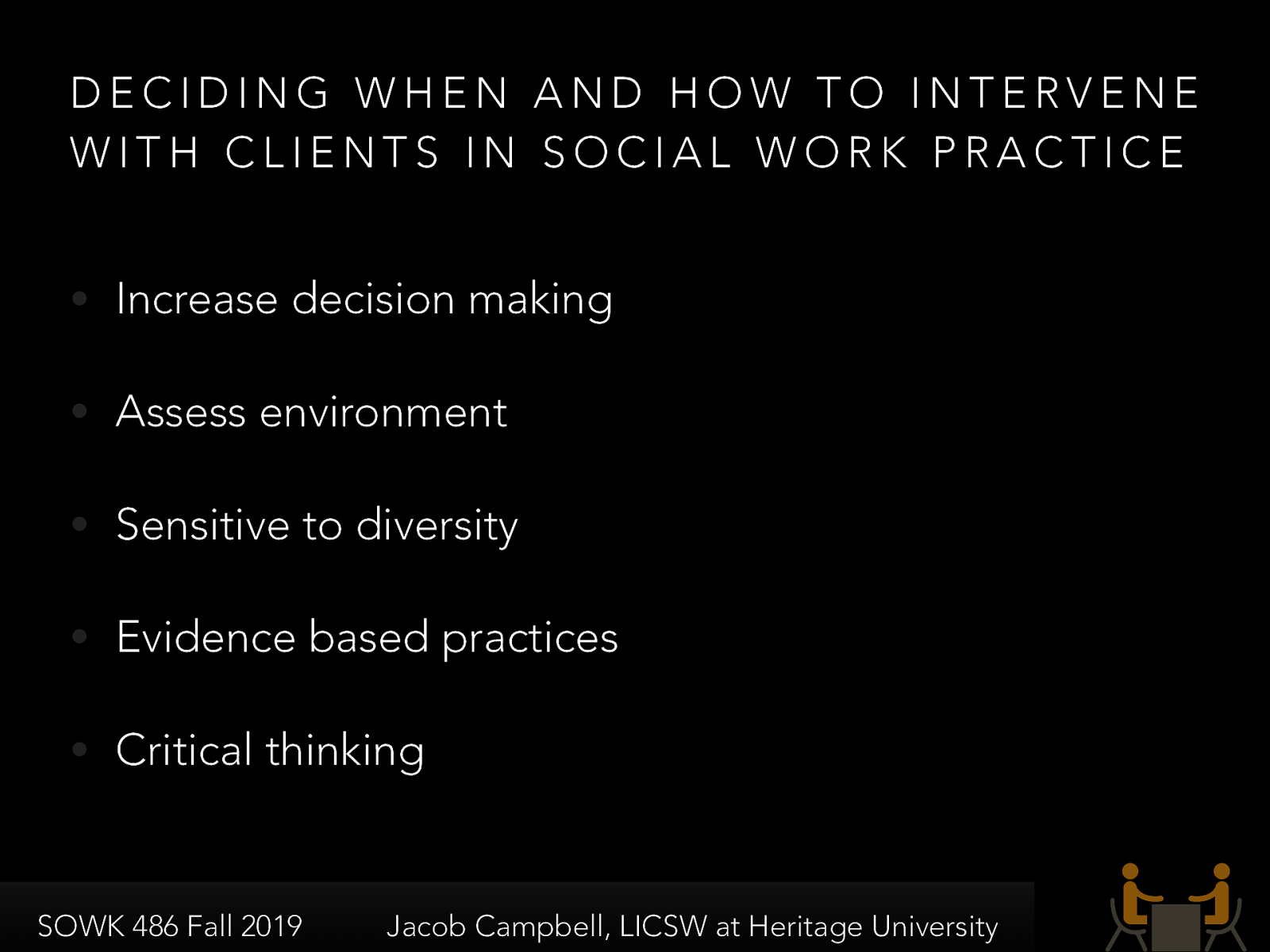
Deciding when and how to intervene with clients in social work practice
Deciding when and how to intervene with our clients is a vital skill that social workers must learn. The following are some of the criteria that we must consider:
- Increase decision making: Social workers value maximum feasible self-determination, empowerment, and enhancing of strengths to increase the client’s voice in decision making.
- Assess: Social workers assess circumstances from a systems perspective, mindful of the person in the situation, the setting, the community, and the organization.
- Sensitive to diversity: Social workers are sensitive to diversity in considering interventions.
- Evidence based practices: Social workers draw on evidence-based practices at both process and intervention levels as well as common factors in determining, together with the client, how to proceed.
- Critical thinking: Social workers think critically about practice, checking out assumptions and examining alternatives.
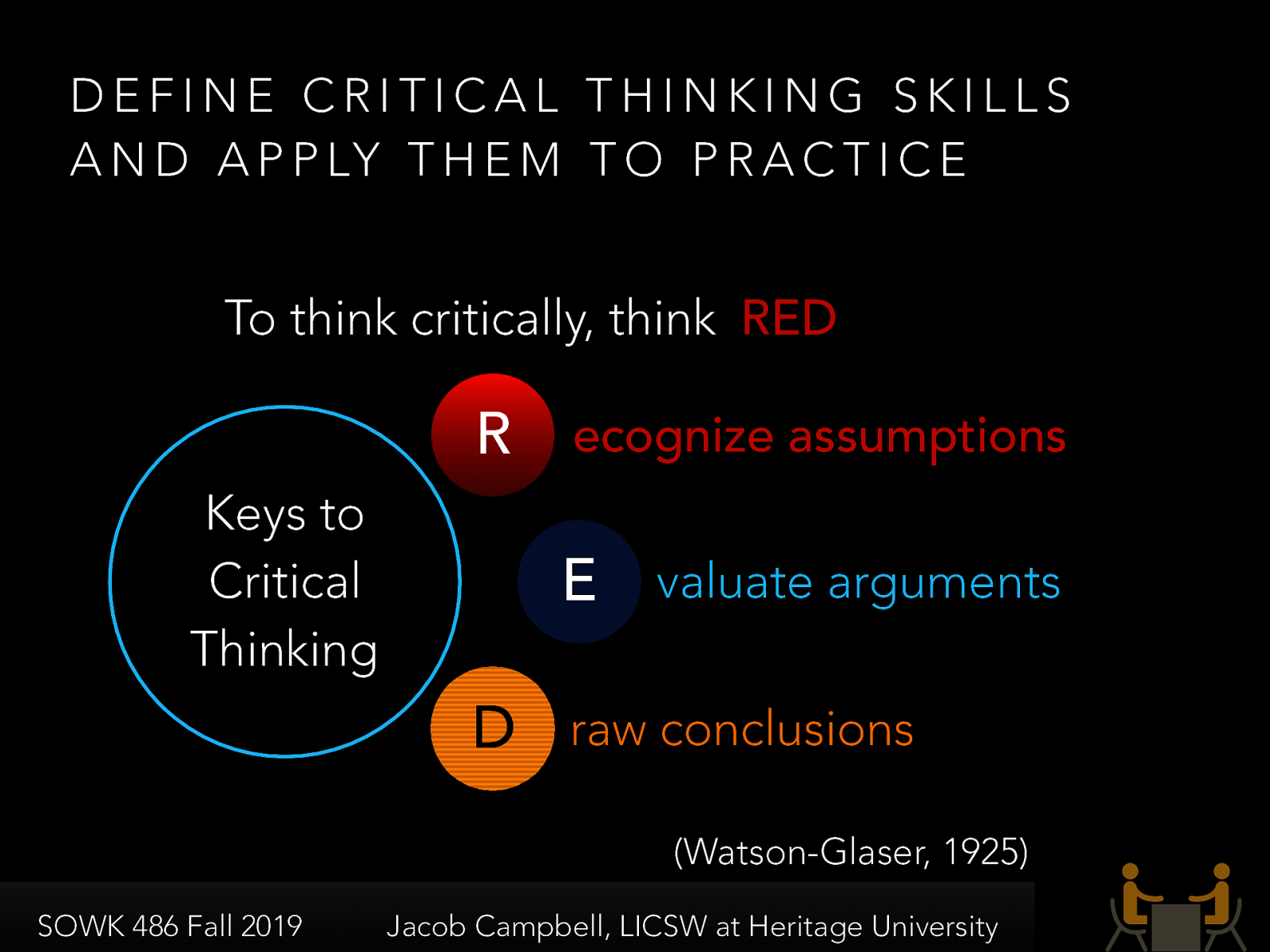
Define Critical Thinking Skills and Apply Them to Practice
(Watson-Glaser, 1925) from https://www.thinkwatson.com/the-red-model Another process for generalist practice is that of critical thinking…
The greatest thing you can learn from college is critical thinking [Discussion] What does critical thinking mean?
- Focuses on the process of reasoning.
- The goal of critical thinking is to evaluate the accuracy of impressions, assess diverse aspects of a situation, and develop creative approaches to finding solutions and making plans.
Think RED
- Recognize Assumptions
- Ask questions
- Assess the established facts and issues involved
- Its okay to question “facts”
- Evaluate Arguments
- Careful scrutiny of what is stated as true or what appears to be true and the resulting expression of an opinion or conclusion based on the scrutiny
- Draw Conclusions
- Creative formulation of an opinion or conclusion when presented with a question, problem, or issue
- Assert a concluding opinion

Eco-Map
The textbook introduces the concept of a eco-map. The graphic below is from a mind map.
- Using eco-maps
- Examples of how they look
- Creating a quick mind/eco-map
[Small Group Activity] Create a eco-map with a partner
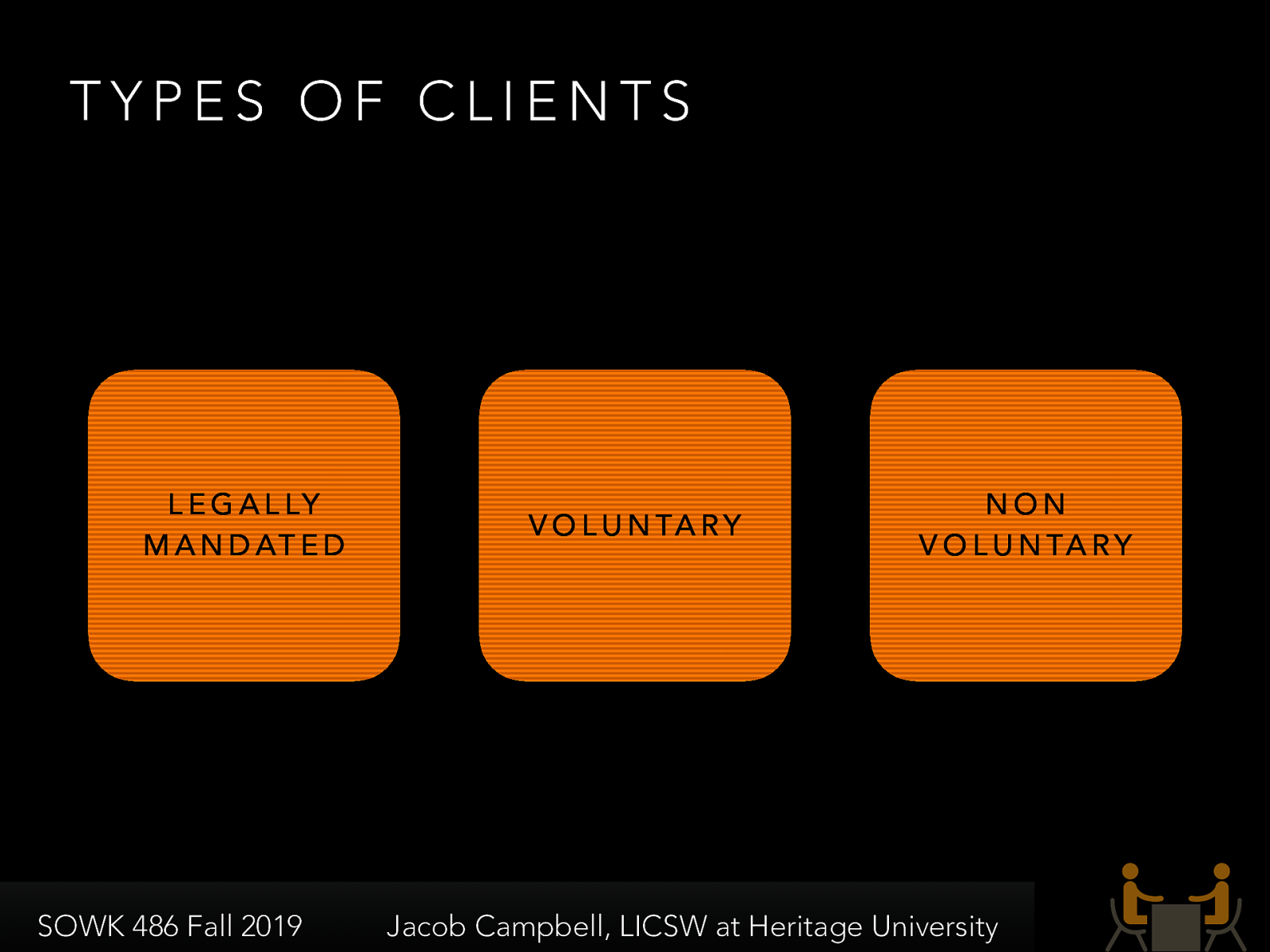
Types of Clients
In social work, we have all types of clients that we work with.
[Whole Class Activity] Discuss the differences and possible clients for each client type.
- legally mandated
- voluntary
- non voluntary

Involuntary Clients (1 of 2)
Involuntary clients are clients that are forced into involvement with social workers and really do not want to be involved. They could be mandated or non-mandated.
[Discussion] What might be some reasons for clients being mandated?
10 suggestions of working with involuntary clients.
- Acknowledge to yourself that the client is indeed voluntary.
- Try to put yourself in the clients shoes.
- Label and help the clients express their negative feelings.
- Clarify your role for the client.
- Know the limits of your authority, and in effect power over the client.

Involuntary Clients (2 of 2)
- Give them as many choices as possible including minor options.
- Figure out what you can do for the client that he or she wants.
- Use pro-social modeling and reinforcement in order to encourage and promote client pro–social values and behaviors.
- Allow the client to gain trust in you and in the intervention process.
- Accept the fact that, ultimately the client has the right to choose whether or not to cooperate with you.
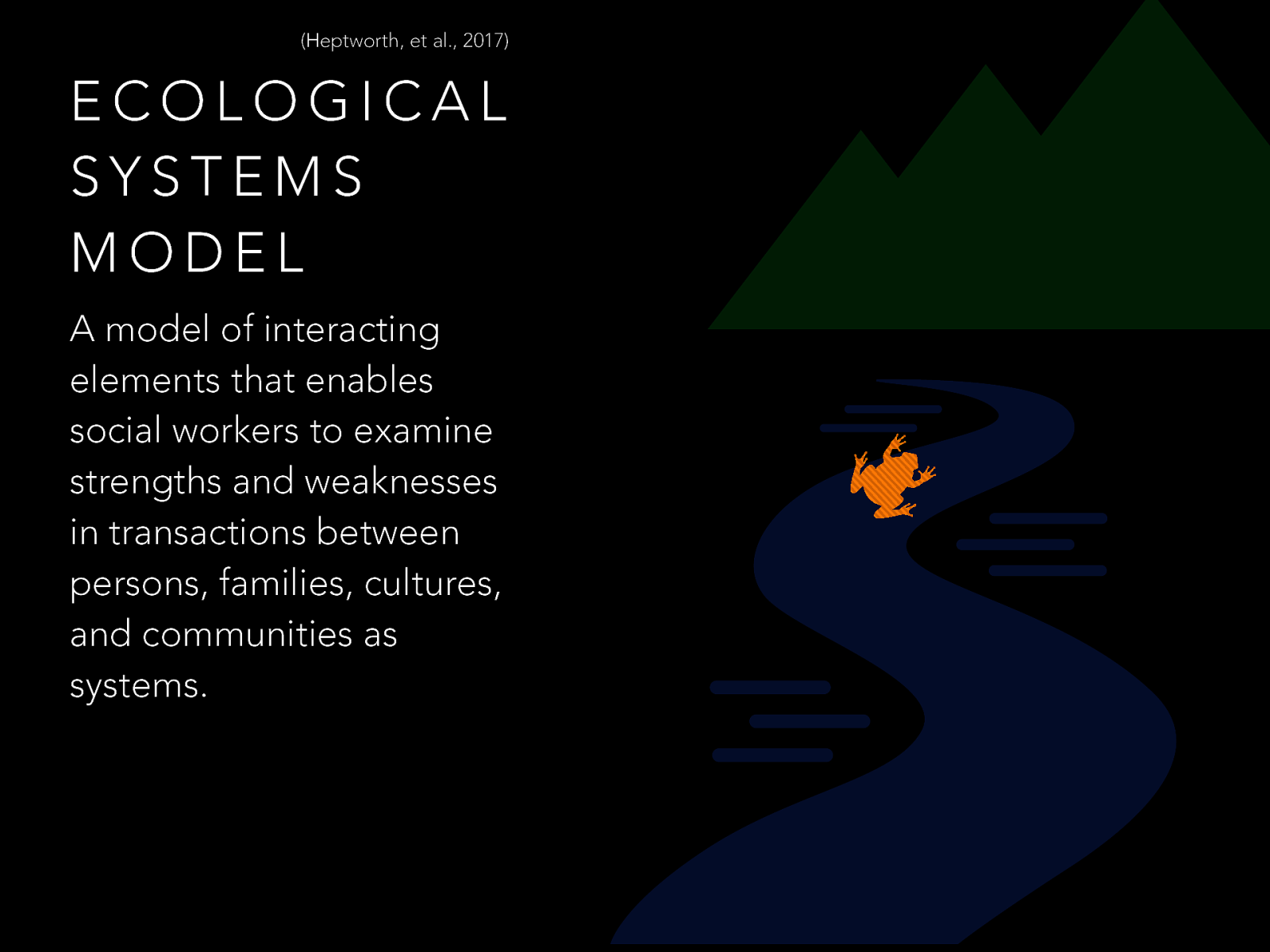
Ecological Systems Model
Didn’t talk about yesterday because I feel like it is a bit more difficult to understand and talk about. It’s a bit different, kind of a combination of both Ecological perspective and systems theory.
“A model of interacting elements that enables social workers to examine strengths and weaknesses in transactions between persons, families, cultures, and communities as systems” (Hepworth, et al., 2017, p. 13)
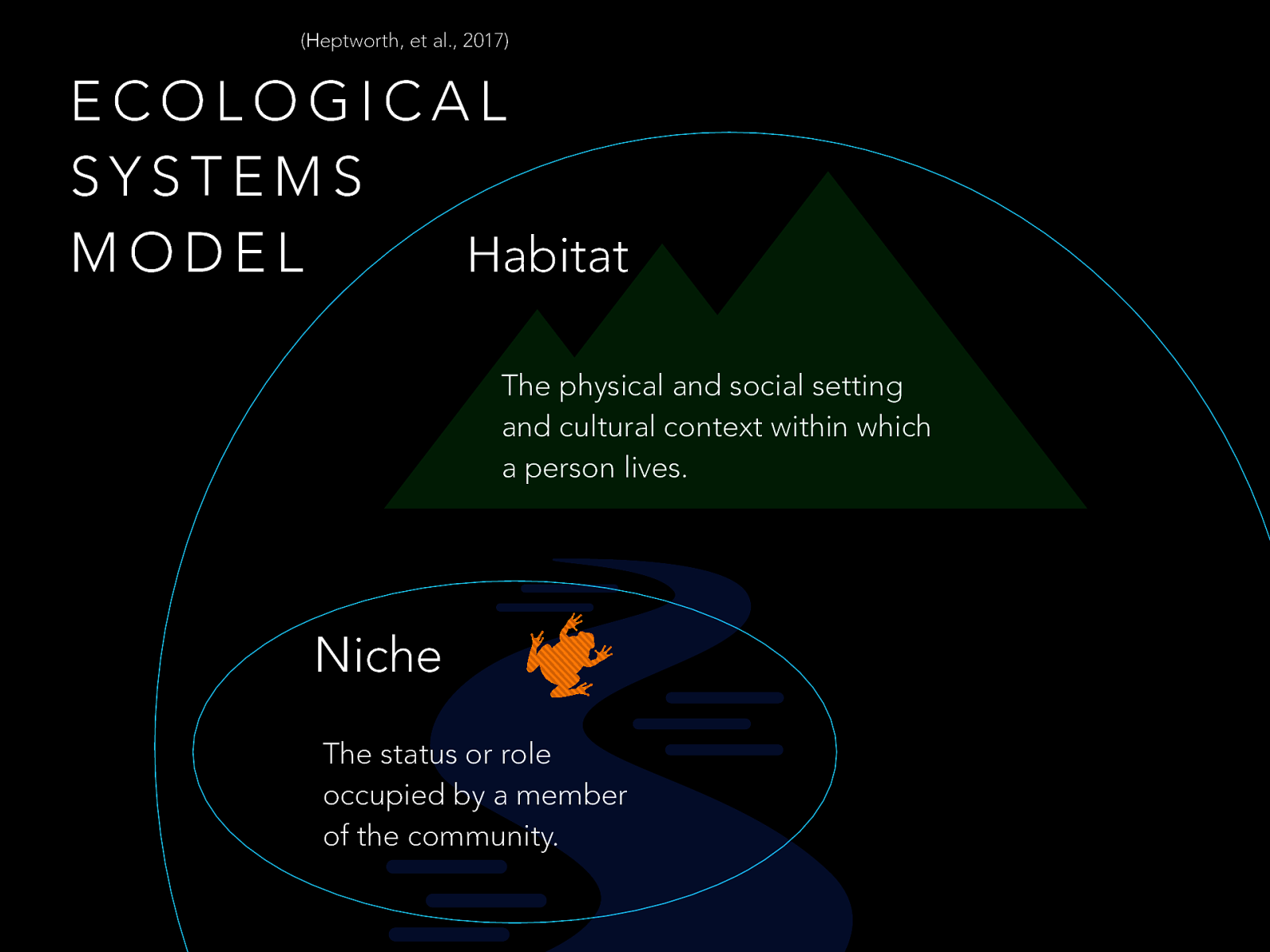
Ecological Systems Model - Habitats and Niche
Straight out of biological terms, the concepts of Habitats and niches are important in ecological systems model.
Habitat: The physical and social setting and cultural context within which a person lives. (i.e. overall environment) Niche: The status or role occupied by a member of the community. (i.e. how the person connects with the habit, think interface)
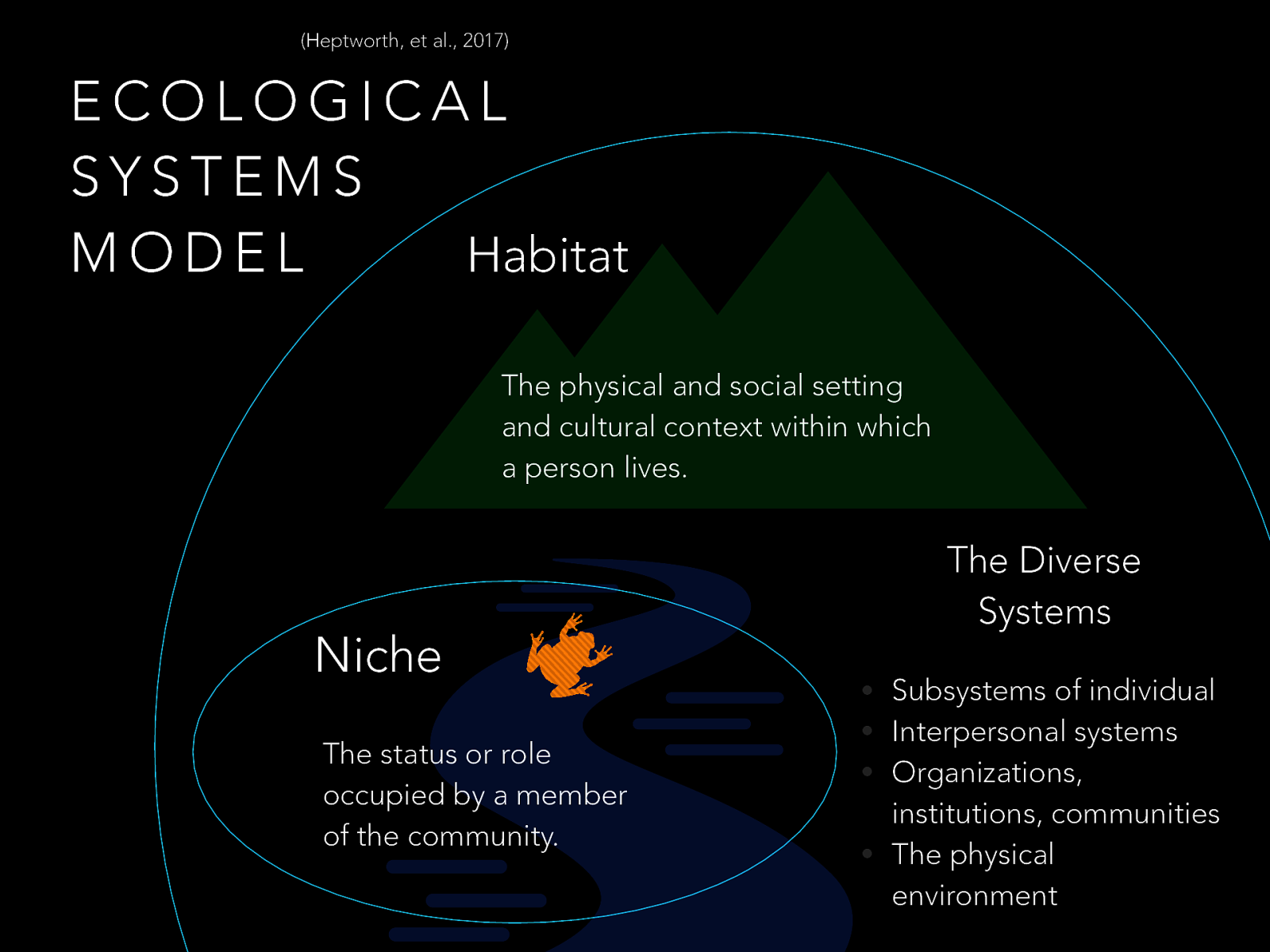
Ecological Systems Model - The Diverse Systems
“Assessment from an ecological systems perspective obviously requires knowledge of the diverse systems involved in interactions between people and their environments”
- Subsystems of individual (biophysical, cognitive, emotional, behavioral, motivational)
- Interpersonal systems (parent/child, marital, family, kin, friends, neighbors, cultural reference groups, spiritual belief systems, other members of social networks)
- Organizations, institutions, communities (housing, neighborhood environment, buildings, other artificial creations, water, weather and climate)
- The physical environment
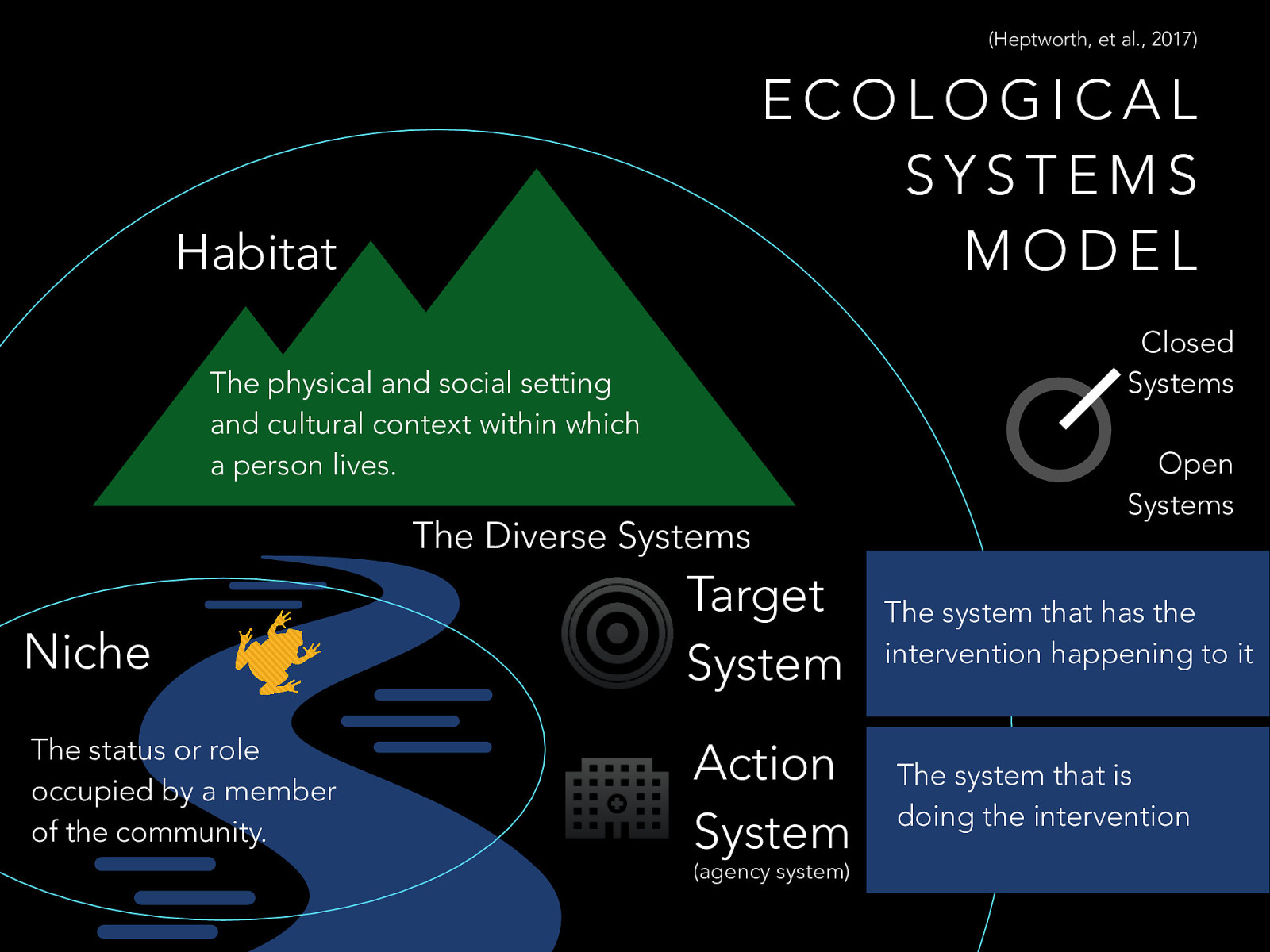
Ecological Systems Model - Other Terms
There are a number of terms that are also associated with ecological systems model. These include:
- Closed Systems vs Open Systems: The ability for input to change the system
- Target System: The system that has the intervention happening to it.
- Action System or the Agency system: The system that is doing the intervention
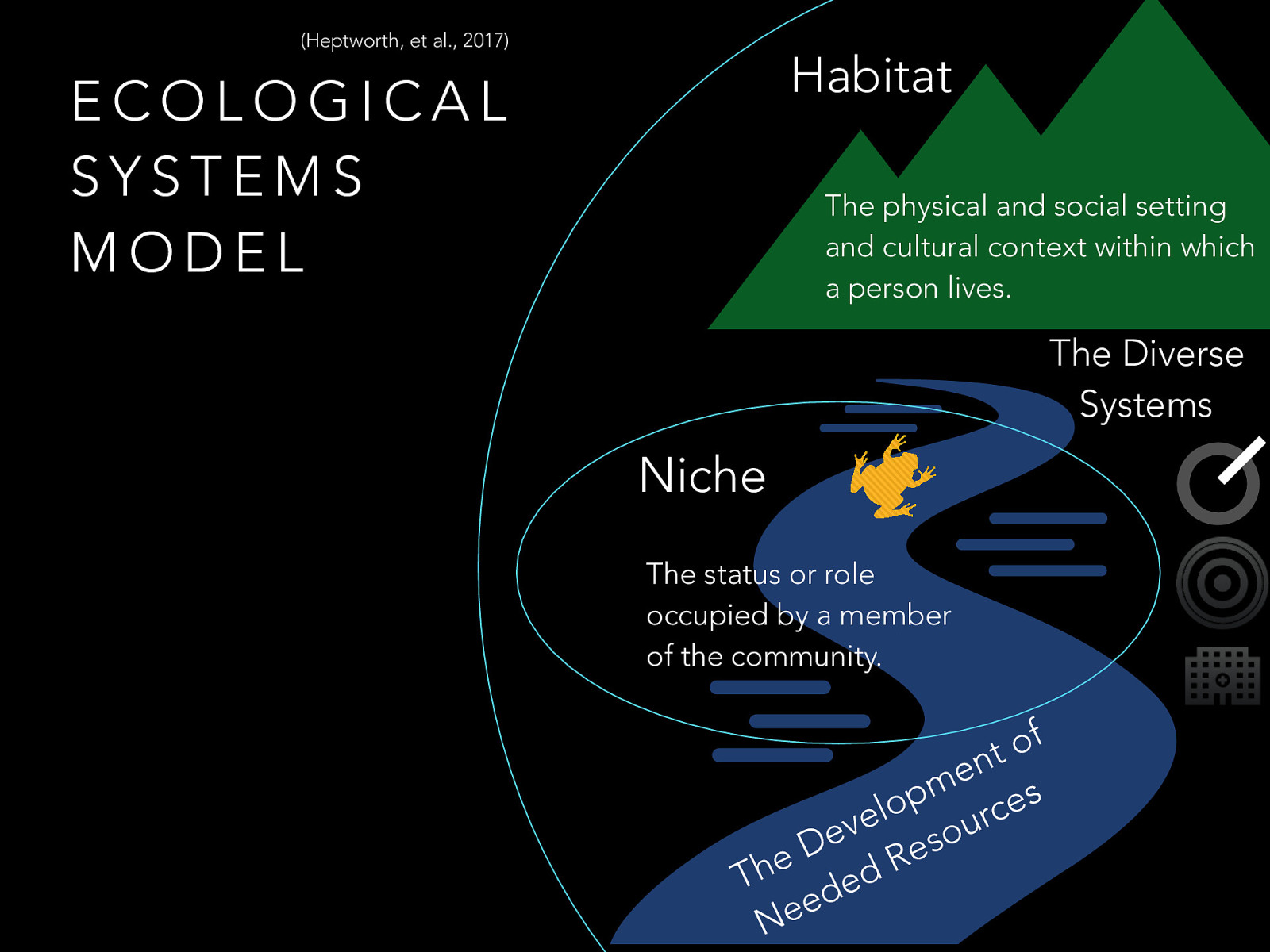
Ecological Systems Model - The Development of Needed Resources
- Filling in the gaps of client needs to reach their goals.
- Think about / tell story of babies floating down the river.

Ecological Systems Model - Mutual Influence of People and Environments
“Ecological systems theory posits that individuals constantly engage in transactions with other humans and with other systems in the environment, and that these individuals and systems reciprocally influence each other.”
Mutual Influence of People and Environments
equifinality: The principle that the same outcome can be achieved even with different starting points. multifinality: The principle that the same starting point may lead to different outcomes.
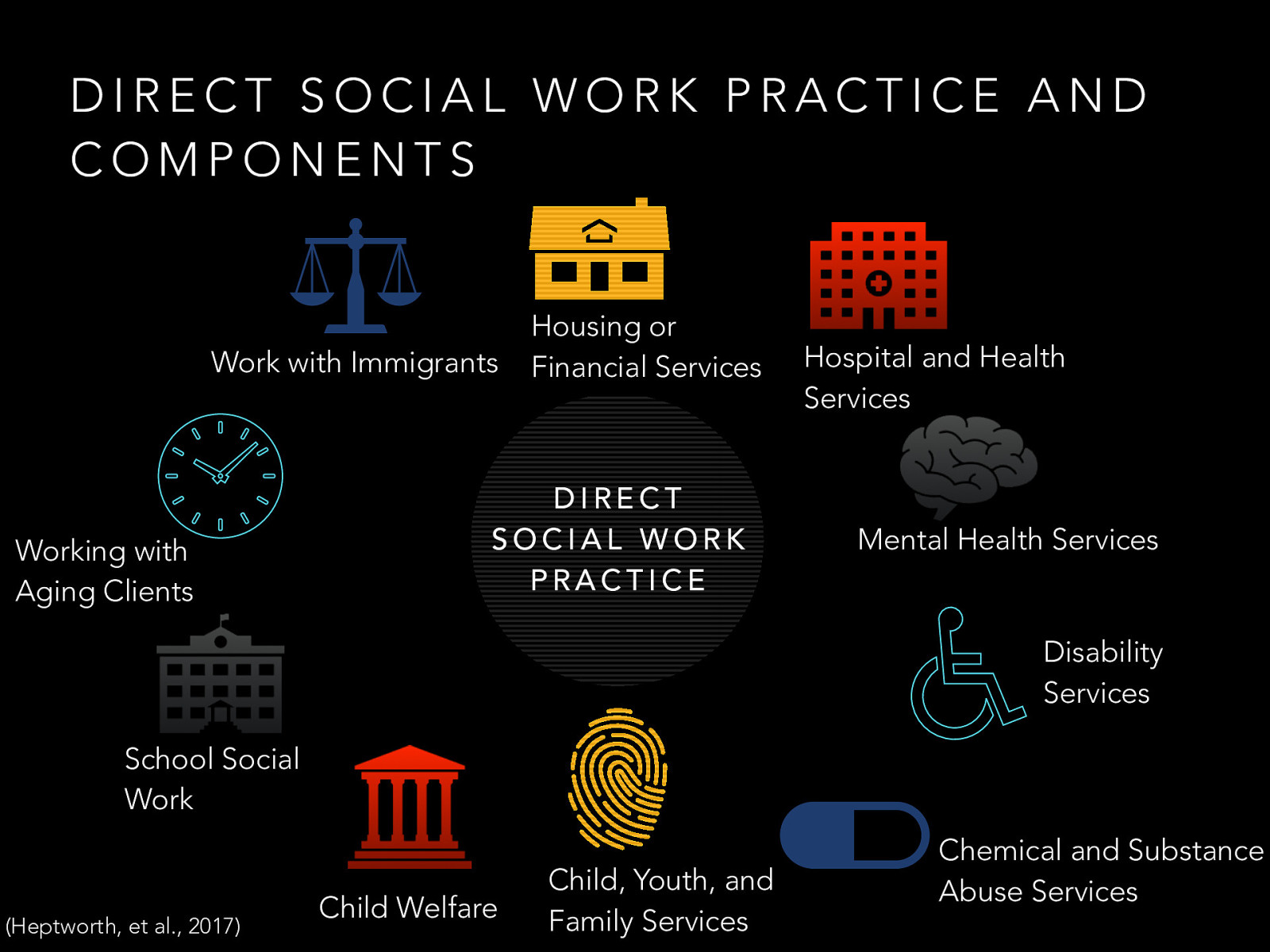
Direct Social Work Practice and Components
Social work is a extremely diverse field. One of the benefits of the generalist methods for social work is that we can practice in so many different fields of practice. While the specific job titles might not be social worker for each one of these professions, these are all areas that we practice in.
[Whole Class Activity - Discussion] discuss each of the fields of practice, with potential examples of roles social workers might take:
Most of the problems that social workers face are complex and could fall in more than one field of practice and it is important to know a wide range of services.
- Work with Immigrants
- Housing or Financial Services
- Hospital and Health Services
- Mental Health Services
- Disability Services
- Chemical and Substance Abuse Services
- Child, Youth, and Family Services
- Child Welfare
- School Social Work
- Working with Aging Clients
[Small Group Activity - Discussion] What areas of practice do you think of when you think of social work?
-> Previous other categories
- Mental health: case management, therapy
- Occupational social work
- EAP Treatment
- Organizational change
- Social services
- Rural social work-addresses needs of those living in rural areas were there is limited resources.
- Police social work-work within police, courthouse, and jail settings to provide services to crime victims.
- Forensic social work-dealing with the law, educating lawyers, and serving as expert witnesses.
- Medical social work-work in hospital settings, and clinics, discharge planning or advocating for patients.
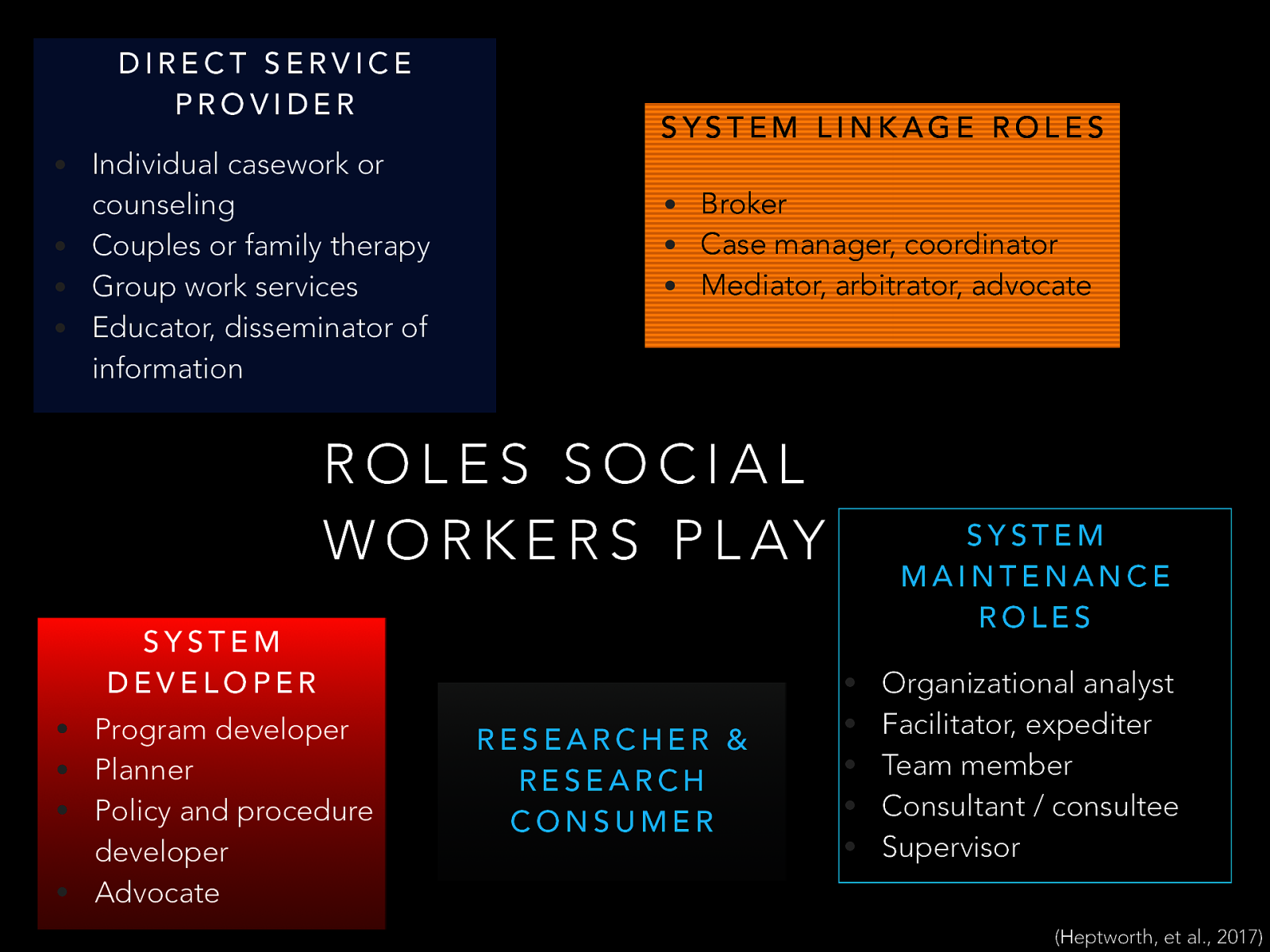
Roles Social Workers Play
Along with the various areas of practice that we fulfill, we also have roles that we implement. These include the following:
- Direct Service Provider
- Individual casework or counseling
- Couples or family therapy
- Group work services
- Educator, disseminator of information
- System Linkage Roles
- Broker
- Case manager, coordinator
- Mediator, arbitrator, advocate
- System Developer
- Program developer
- Planner
- Policy and procedure developer
- Advocate
- Researcher & Research Consumer
- System Maintenance Roles
- Organizational analyst (worker who pinpoints factors in agency structure, policy, and procedures that have a negative impact on service delivery)
- Facilitator, expediter
- Team member
- Consultant / consultee
- Supervisor
An overview of Direct Social Work Practice. The following is the agenda:
- How we help
- Evidence-based practice
- Involuntary clients
- Ecological Systems Model
- Social work jobs and roles
